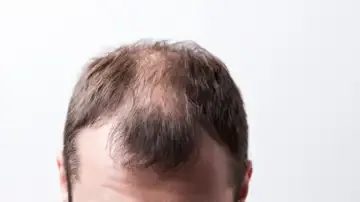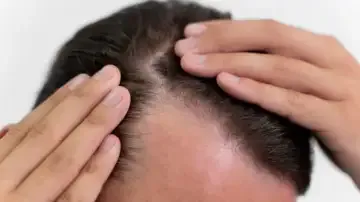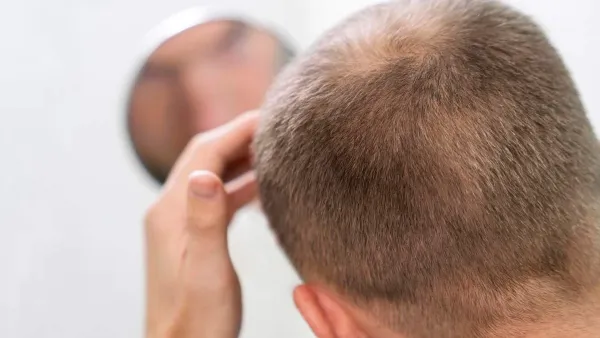In general, a person loses between 50 and 100 hairs a day on average. This is normal. However, if you go on to lose more than 100 hairs a day or notice thinning, excessive shedding, or bald patches, it might be time to address it immediately.
If you are someone who has already been diagnosed with alopecia areata, doctors recommend identifying the cause and avoiding five things to worsen the condition. Read on to know all the details.
Common Causes Of Alopecia Areata

Alopecia areata is an autoimmune disease that causes significant hair loss, often in circular patches on the scalp. This happens when the immune system mistakenly attacks hair follicles, leading to without causing permanent damage to the follicles.
According to StatPearls Publishing, the lifetime risk of developing alopecia areata in the general population is around 2%, with a prevalence of approximately 1 in 1000.
Dr Sanjib Chowdhury, Consultant - Dermatology, Fortis Hospital, Anandapur, lists some of the common causes of alopecia areata:
Stress
Emotional stress, trauma, or anxiety can weaken the immune system, potentially triggering or worsening alopecia areata.
Illness Or Infections
Bacterial or viral infections may provoke autoimmune responses in genetically susceptible individuals, leading to hair follicle attack.
Hormonal Changes
Hormonal shifts during puberty, pregnancy, childbirth, or menopause can influence immune activity and may trigger or worsen hair loss.
Trauma Or Injury
Physical injuries or surgeries, especially to the scalp, may induce hair loss through the Koebner phenomenon, where skin trauma causes .
Allergens And Chemical Exposures
Exposure to certain chemicals, hair products, or environmental pollutants may aggravate the condition in sensitive individuals.
Medication
Rarely, specific medications may lead to alopecia areata as a side effect.
Things People With Alopecia Areata Should Avoid

Unfortunately, alopecia areata is not curable. However, there are treatments to help manage the condition and promote hair regrowth. Dr Chowdhury also recommends avoiding certain things that could trigger or worsen the condition.
- Don't scratch or pick your scalp.
- Avoid tight hairstyles, as they pull on hair and may aggravate alopecia areata.
- Skip harsh hair products with sulphates and alcohol.
- Be gentle with hair care; minimise brushing and styling stress.
- Protect your scalp; use mild shampoos and moisturise regularly.
Can Dietary Habits Worsen Alopecia Areata?

Definitely. Dr Chowdhury says, "Certain dietary components are known to trigger or worsen autoimmune conditions. Common culprits include gluten (especially in coeliac disease or autoimmune thyroid conditions), dairy, refined sugars, and highly processed foods, which can promote inflammation. Nightshade vegetables (e.g., tomatoes, peppers) may cause flares in some individuals, particularly in rheumatoid arthritis. Alcohol and excessive caffeine can also exacerbate symptoms in some cases."
He adds that omega-6 fatty acids, found in many vegetable oils, may promote inflammation if not balanced with omega-3s. "Each autoimmune condition and individual may react differently, so identifying specific triggers through an elimination diet or working with a healthcare provider or dietitian can be helpful in managing symptoms effectively and supporting immune health."
Conclusion
Living with alopecia areata can be challenging, but knowing what might trigger or worsen the condition can help you feel more in control. Simple steps, like being gentle with your hair, avoiding harsh products, and paying attention to what you eat, can go a long way in managing flare-ups. Everyone's experience is different, so it's important to work with a doctor to understand what works best for you.

 Alopecia areata is an autoimmune disease that causes significant hair loss, often in circular patches on the scalp. This happens when the immune system mistakenly attacks hair follicles, leading to without causing permanent damage to the follicles.
According to StatPearls Publishing, the lifetime risk of developing alopecia areata in the general population is around 2%, with a prevalence of approximately 1 in 1000.
Dr Sanjib Chowdhury, Consultant - Dermatology, Fortis Hospital, Anandapur, lists some of the common causes of alopecia areata:
Stress
Emotional stress, trauma, or anxiety can weaken the immune system, potentially triggering or worsening alopecia areata.
Illness Or Infections
Bacterial or viral infections may provoke autoimmune responses in genetically susceptible individuals, leading to hair follicle attack.
Hormonal Changes
Hormonal shifts during puberty, pregnancy, childbirth, or menopause can influence immune activity and may trigger or worsen hair loss.
Trauma Or Injury
Physical injuries or surgeries, especially to the scalp, may induce hair loss through the Koebner phenomenon, where skin trauma causes .
Allergens And Chemical Exposures
Exposure to certain chemicals, hair products, or environmental pollutants may aggravate the condition in sensitive individuals.
Medication
Rarely, specific medications may lead to alopecia areata as a side effect.
Things People With Alopecia Areata Should Avoid
Alopecia areata is an autoimmune disease that causes significant hair loss, often in circular patches on the scalp. This happens when the immune system mistakenly attacks hair follicles, leading to without causing permanent damage to the follicles.
According to StatPearls Publishing, the lifetime risk of developing alopecia areata in the general population is around 2%, with a prevalence of approximately 1 in 1000.
Dr Sanjib Chowdhury, Consultant - Dermatology, Fortis Hospital, Anandapur, lists some of the common causes of alopecia areata:
Stress
Emotional stress, trauma, or anxiety can weaken the immune system, potentially triggering or worsening alopecia areata.
Illness Or Infections
Bacterial or viral infections may provoke autoimmune responses in genetically susceptible individuals, leading to hair follicle attack.
Hormonal Changes
Hormonal shifts during puberty, pregnancy, childbirth, or menopause can influence immune activity and may trigger or worsen hair loss.
Trauma Or Injury
Physical injuries or surgeries, especially to the scalp, may induce hair loss through the Koebner phenomenon, where skin trauma causes .
Allergens And Chemical Exposures
Exposure to certain chemicals, hair products, or environmental pollutants may aggravate the condition in sensitive individuals.
Medication
Rarely, specific medications may lead to alopecia areata as a side effect.
Things People With Alopecia Areata Should Avoid
 Unfortunately, alopecia areata is not curable. However, there are treatments to help manage the condition and promote hair regrowth. Dr Chowdhury also recommends avoiding certain things that could trigger or worsen the condition.
Unfortunately, alopecia areata is not curable. However, there are treatments to help manage the condition and promote hair regrowth. Dr Chowdhury also recommends avoiding certain things that could trigger or worsen the condition.
 Definitely. Dr Chowdhury says, "Certain dietary components are known to trigger or worsen autoimmune conditions. Common culprits include gluten (especially in coeliac disease or autoimmune thyroid conditions), dairy, refined sugars, and highly processed foods, which can promote inflammation. Nightshade vegetables (e.g., tomatoes, peppers) may cause flares in some individuals, particularly in rheumatoid arthritis. Alcohol and excessive caffeine can also exacerbate symptoms in some cases."
He adds that omega-6 fatty acids, found in many vegetable oils, may promote inflammation if not balanced with omega-3s. "Each autoimmune condition and individual may react differently, so identifying specific triggers through an elimination diet or working with a healthcare provider or dietitian can be helpful in managing symptoms effectively and supporting immune health."
Conclusion
Living with alopecia areata can be challenging, but knowing what might trigger or worsen the condition can help you feel more in control. Simple steps, like being gentle with your hair, avoiding harsh products, and paying attention to what you eat, can go a long way in managing flare-ups. Everyone's experience is different, so it's important to work with a doctor to understand what works best for you.
Definitely. Dr Chowdhury says, "Certain dietary components are known to trigger or worsen autoimmune conditions. Common culprits include gluten (especially in coeliac disease or autoimmune thyroid conditions), dairy, refined sugars, and highly processed foods, which can promote inflammation. Nightshade vegetables (e.g., tomatoes, peppers) may cause flares in some individuals, particularly in rheumatoid arthritis. Alcohol and excessive caffeine can also exacerbate symptoms in some cases."
He adds that omega-6 fatty acids, found in many vegetable oils, may promote inflammation if not balanced with omega-3s. "Each autoimmune condition and individual may react differently, so identifying specific triggers through an elimination diet or working with a healthcare provider or dietitian can be helpful in managing symptoms effectively and supporting immune health."
Conclusion
Living with alopecia areata can be challenging, but knowing what might trigger or worsen the condition can help you feel more in control. Simple steps, like being gentle with your hair, avoiding harsh products, and paying attention to what you eat, can go a long way in managing flare-ups. Everyone's experience is different, so it's important to work with a doctor to understand what works best for you.